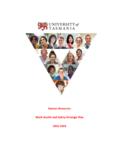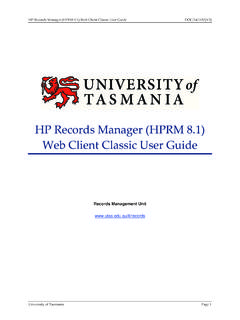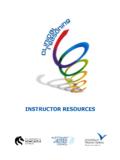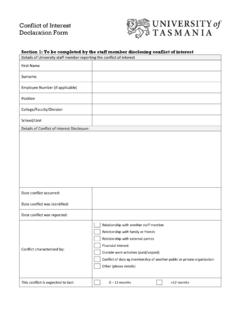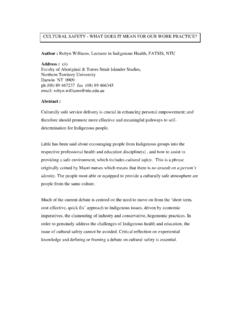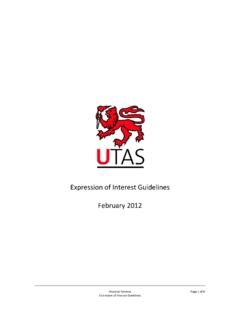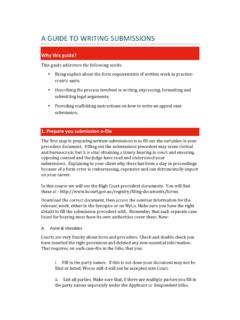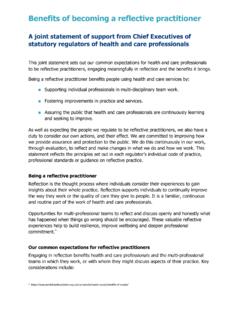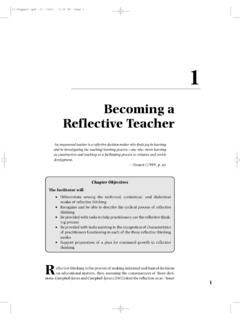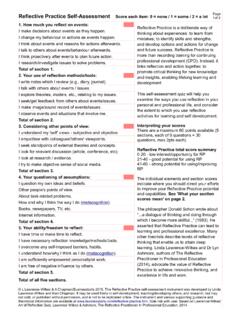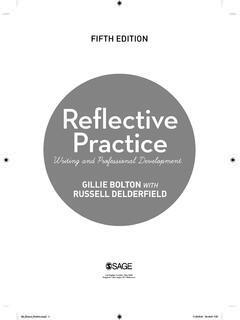Transcription of The Reflective Learning Model: Supervision of Social Work ...
1 The Reflective Learning Model: Supervision of Social Work StudentsAllyson Mary Davys & Liz BeddoeA key task for the field education supervisor is to facilitate reflection in beginningpractice, and to promote in the student a sense of ownership, mastery and understandingof his or her clinical process. At the same time the supervisor is charged to instruct andguide the student. A major challenge for the supervisor is to balance these two dimensionsof Supervision and maintain a focus on the student s experience rather than thesupervisor s expertise. The authors present a Reflective Learning Model which identifiesthe importance of both facilitative and didactic interventions within effective case study is provided to demonstrate the model in : Student Supervision ; Field Education; Practice Teaching and Learning ; Reflective LearningIntroductionThe Reflective Learning Model emphasises the importance of reflection forresponsive practice.
2 The ability to reflect however is dependent on the practitioner slevel of competence and experience. The skills and interventions employed by thesupervisor of a student are thus different from those employed by the supervisor ofan experienced practitioner . The model presented here, developed from previouswork by the authors (Davys and Beddoe, 2000; Davys, 2001) uses Butler s (1996)stages of competence to consider the skills and processes required when supervising asocial work student. The paper presents a case study to demonstrate the model andillustrate how Supervision can encourage a student to deepen his or herunderstanding of the multiplicity of understandings (and misunderstandings)present in a challenging practice to: Liz Beddoe, Head of School Counselling, Human Services and Social Work, Faculty of Education,University of Auckland, Private Bag 92-601, Symonds St, Auckland 1035, New Zealand.
3 Tel:+64 9 6238899; Mary Davys, Waikato Institute of Technology, New Zealand & Liz Beddoe, University of Auckland, Work EducationVol. 28, No. 8, December 2009, pp. 919 933 ISSN 0261-5479 print/1470-1227 online#2009 Taylor & FrancisDOI: Reflective Learning Model rests on the premise that Supervision is a forum forlearning and that the main vehicle for Learning is reflection. Reflection in this contextrefers to a conscious bringing to the surface of different forms of knowledge, whileattending to the thoughts and emotions present in the student bothin situand afterthe experience. This is neatly described by Ruch (2000, p.)
4 108): Reflective Learning is an holistic, creative and artistic phenomenon whichendeavours to hold theory and practice together in a creative tension. It alsoallows for uncertainty and mistakes and acknowledges the humanity ofpractitioners and clients. Reflective Learning which acknowledges the complexity,diversity and emotionality of situations offers more scope for student practitionersto reach informed decisions which, by embracing the breadth of knowledgeswhich influence decisions, could help avoid defensive, routinised and is the contention of the authors that students benefit from clear, structuredfacilitation of their experiences as reflection may not always come easily.
5 As a Learning process , Supervision is driven from the experience of the learner (thesupervisee) rather than from the wisdom and knowledge of the supervisor, a viewsupported by Morrison (2001) who asserts that the key to Learning and developmentlies in the ability to engage in, and make use of, the worker s experience (Morrison,2001, p. 57). This poses a challenge to the supervisor of a student who must thereforeassess what experience a student has, in the broadest sense, and how can thatexperience can be drawn into fundamental tensions are present in student Supervision :1. The balance between the didactic processes of teaching (information giving andinstruction) and facilitation of student Learning through The fostering of reflection in situations where there is limited experience and whichare overlaid by anxiety.
6 This anxiety may stem from a number of sources whichinclude the nature of the work and the student assessment process (Ruch, 2002).3. The management of the dependence autonomy continuum as students test their newknowledge and skills in real work (Beddoe, 2000).Reflection, Competence and the New PractitionerThe task which lies at the heart of all Supervision is to develop student/practitionercompetence. Butler (1996), in rejecting models which suggest that competence isdeveloped through an increased repertoire of skills and techniques or through theunconscious imbedding of basic principles, describes a model of performancedevelopment based on reflection.
7 His model rests on the assertion that, throughreflection, performance is transformed. And it is this transformation that bringsabout improvement in the performance (Butler, 1996, p. 277). Reflection, however,is not necessarily an easy option for the very new (1996) describes five stages of competence development. For the purposes ofthis paper we shall focus on the first two stages of this model, novice and advanced920A. M. Davys & L. Beddoebeginner, as they reflect the stages of development commonly demonstrated bystudent , the first stage of Butler s model, describes a context where practitioners(students) are new to the work and have no experience of the situations which mightarise.
8 Practice at this level is rule governed . In order to begin to practise the studentrequires rules to shape and guide practice. The behaviour of novices is extremelylimited and very inflexible (Butler, 1996, p. 278).The second stage of Butler s model,Advanced Beginner, is characterised by thepractitioner s belief that there is an answer to every problem and that someone willknow what to do. The source of knowledge is thus located in someone other thanthe student and most commonly that person is the supervisor. At this stage thestudent will have had sufficient experience of practice to be able to identify themain areas of importance but his or her repertoire of interventions will be limitedand solutions will be considered either right or wrong.
9 In a similar vein, Loganbillet al.(1982, p. 17) describe a beginning practitioner as exhibiting na veunawareness .. narrow and rigid thought patterns and as having a strongdependence on Supervision . It is important however to consider this dependence incontext. Lizzioet al. (2005, p. 251) remind us that, for the student, dependencemay be seen as professional safety and demonstrate appropriate deferral to theexpertise of the supervisor and also be an indication of trust and safety within challenges are presented for the supervisor. At this beginning stagepractitioners are often resistant to reflection in that they are generally impatient withcomplex answers or invitations to think the problem out for themselves (Butler,1996, p.)
10 278). Butler concludes that novice and advanced beginners can take in littleof the complexity of their performance situation, it is too new, too strange, and theyhave to spend time remembering the rules they have set for them (Butler, 1996,p. 278). He identifies three requirements for novices and advanced beginners:Nsupport to understand the performance setting;Nhelp to set priorities; andNassistance to learn to reflect on their own performance and become less rigid and moreflexible by developing and trusting their own personal practical knowledge (Butler,1996, p. 278).Beginning practitioners or students thus require a mixture of interventions whichare equally weighted at both ends of the didactic facilitative continuum.

